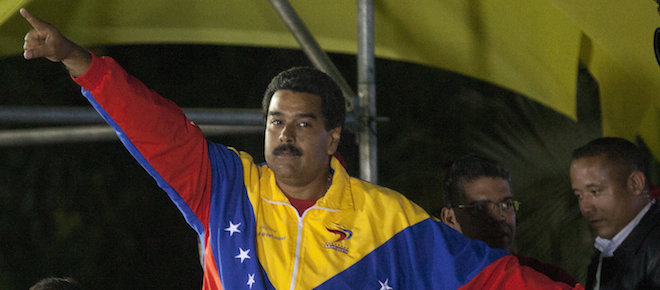Chavez’s hand-picked successor Nicolas Maduro elected Venezuelan president
Runner-up Henrique Capriles calls for a recount amid close results
Venezuela’s newly elected President Nicolas Maduro celebrates his victory after the official results of the presidential elections were announced, at the Miraflores Palace in Caracas, Venezuela, late Sunday, April 14, 2013. Maduro, Hugo Chavez’s hand-picked successor, won a razor-thin victory in Sunday’s special presidential election, edging the opposition leader Henrique Capriles by only about 300,000 votes, electoral officials announced. (AP Photo/Ramon Espinosa)
Share

Nicolas Maduro has been elected Venezuelan president, replacing the late Hugo Chavez, who died from cancer on March 5.
Maduro, 50, was the protegé Chavez chose to continue his legacy before he died. Maduro will now serve the remainder of Chavez’s six-year term as president.
The election, however, was a close one. Maduro, a former bus driver, won with 50.7 per cent of the vote after 99 per cent of the votes had been counted, Bloomberg News reported Monday. That result was the closest the country has seen since 1968 and many in the country are questioning the legitimacy of the results.
The runner-up was Henrique Capriles, who stepped down as governor of Miranda state to run. He finished with 49.1 per cent of the vote, which was a closer result than expected. Capriles said he will challenge the results and is calling for a recount. “Mr. Maduro, you were the loser … This system is collapsing, it’s like a castle of sand – touch it and it falls,” Capriles said after the results.
The close results could create issues for the new leader, and are likely to increase the potential for challenges from both within his party and from an opposition buoyed by a close election.
While Maduro ran his campaign on the same anti-America messages that Chavez championed, there is some hope that the change of power could improve relations with the U.S., reports The New York Times:
But over the weekend, with his election victory looking likely, Mr. Maduro sent a private signal to Washington that he was ready to turn the page. Bill Richardson, the former governor of New Mexico, who was in Caracas as a representative of the Organization of American States, said in an interview that Mr. Maduro called him aside after a meeting of election observers on Saturday and asked him to carry a message.
“He said, ‘We want to improve the relationship with the U.S., regularize the relationship,’ ” Mr. Richardson said.
At this point, the election board has said that Maduro’s election is “irreversible” and it has not consented to any type of audit, reports Reuters.
Uncertainty about the election result is just one of the issues Maduro will face as he moves forward with the so-called “Chavismo” movement. He will take control of a country with, as Reuters writes: “high inflation, a slowing economy, Byzantine currency controls and one of the world’s worst violent crime rates.”